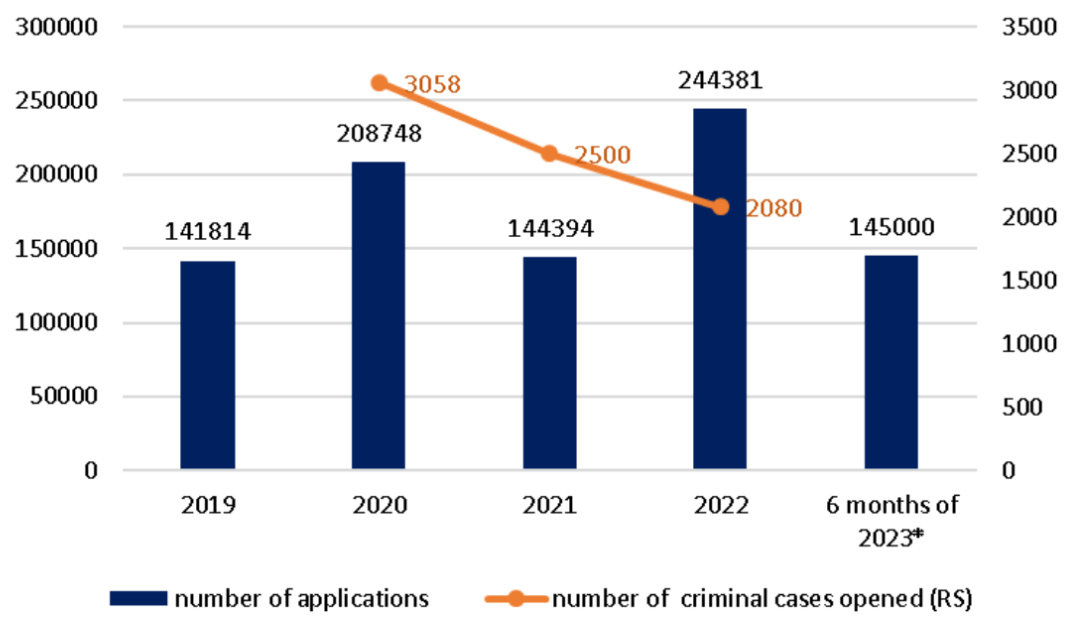A review of draft laws registered from November 27 to December 10.
The past two weeks were less productive compared to the previous two-week periods: during this time, 46 projects were registered, including 24 resolutions and 22 laws. One of the law projects was authored by the President of Ukraine, four by the Cabinet of Ministers, and the remaining 17 by people’s deputies. For the two weeks, lawmakers paid particular attention to combating corruption.
Fighting bribery of foreign officials
Government Project No. 10319 envisages that the State Tax Service (STS) will investigate businesses for evidence of bribery or the provision of unlawful benefits (money, property, privileges, services, etc.) to foreign public officials (representatives of government, parliament, or the judiciary, officials of state-owned enterprises, and government agencies such as customs officers, phytosanitary inspectors, representatives of state agencies, etc.). The National Anti-Corruption Bureau (NABU) will develop a list of such facts.
Under OECD recommendations, a prohibition on tax deductions for expenses incurred to facilitate corruption or bribery of foreign public officials should be introduced as a legal requirement. It is understood that in a company’s financial reports, there will unlikely be a line item for “bribes” or “illicit benefits.” However, there may be other expenses the STS can qualify for as related to international operations and having reduced taxable income (e.g., consulting services and brokerage services).
If tax authorities detect instances of bribery as identified by NABU, the draft law includes the following provisions:
- Obligation for businesses to retain primary and other documents, information, and indicators related to tax calculation and payment for three years longer than specified by the Tax Code (different records are currently retained for 3 to 7 years).
- Imposing a fine equal to 7.5% of the amount (difference) of increased expenses that decreased income tax. The STS must determine such costs during the company’s audit, and audits can be conducted without observing the statute of limitations.
- Imposing a fine on the taxpayer of 50% of the tax liability or the value of taxable objects for Diia City residents.
Prohibiting doctors and pharmacists from promoting medications for money
Legislative Project No. 10293 aims to enhance the objectivity of the professional activities of healthcare professionals and pharmacists by prohibiting them from receiving money or gifts from pharmaceutical companies for prescribing specific medications. Medical workers are also prohibited from using promotional materials provided by pharmaceutical companies to write prescriptions for patients. Furthermore, medical personnel will be banned from using their authority for personal purposes or the benefit of related parties.
The main idea behind the project is to prevent the influence of financial incentives on the professional decisions of medical and pharmaceutical professionals.
Fighting corruption in the allocation of land for placing street vendors’ kiosks and parking spaces
Legislative Project No. 10308 introduces online auctions to allocate the right to set up street vendors’ kiosks and parking spaces. This mechanism aims to ensure open access for interested parties to participate in the competition, increase competitiveness, boost revenues for both central and local budgets, and enable public oversight of the land allocation process, thereby helping to reduce corruption in this field. Additionally, the planned layouts of such outlets will be subject to public discussion, ensuring citizen involvement in decision-making related to urban development.
For parking spaces, auctions will be used to determine:
- The lessee of a land plot designated explicitly for parking (in this case, the lessee becomes the operator).
- The operator granted the use (not lease) of a portion of the road where they will set up and maintain a parking area.
Polygraph testing for high-ranking officials
MPs have registered a bill that suggests implementing voluntary polygraph testing for all high-ranking officials, ranging from judges to Ministers and people’s deputies) to identify collaborators and agents of the Kremlin. They will be examined on matters that could threaten Ukraine’s national security, including their connections with Russian and Belarusian intelligence agencies, cooperation with representatives of these countries, foreign citizenship, dissemination of classified information about the Armed Forces of Ukraine, and more.
Despite the lack of scientific evidence supporting the effectiveness of polygraphs, they are widely used in various sectors in Ukraine. However, information obtained in this way cannot be accepted by courts as evidence in a case; they serve only as guidelines for gathering official evidence. Accordingly, the legislative proposal establishes that undergoing a polygraph test will be voluntary, and the results cannot be used as grounds for dismissal or initiation of criminal proceedings. Although these examinations will not have legal force, Ukraine’s Security Service and intelligence agencies will use them as additional information.
Adopting children
The proposal outlined in Legislative Project No. 10298 suggests prohibiting individuals who collaborate with Russia and Belarus (punished under articles related to “State Treason,” “Collaborationist Activities,” “Aiding an Aggressor State,” “Justification, Recognition as Legitimate, or Denial of Armed Aggression by the Russian Federation against Ukraine”) from adopting children. Additionally, these restrictions will apply to individuals who have been held administratively accountable for domestic violence and gender-based violence.
Figure 1. The number of reports concerning cases of domestic violence and investigations opened concerning them.
*Approximate data. Sources: Publications in Yur-gazeta, Higher School of Advocacy, Jurfem.
During the first half of 2023, Ukraine saw a 40% increase in reported cases of domestic violence compared to previous periods (see Figure 1). However, only a small fraction of these cases are brought before the courts. In 2021, there were 1,498 convictions under Article 126-1 of the Ukrainian Criminal Code, while in 2022, there were 962.
Currently, an individual who has been convicted of domestic violence and has received a criminal penalty cannot become an adoptive parent. However, there is a risk of children being placed in the care of individuals who have only received administrative penalties for this offense.
Demobilization
Military-related topics are consistently relevant for lawmakers. At the beginning of December, two legislative proposals were registered, which suggest introducing additional conditions for demobilization: one in the case of a servicemember’s death or disappearance without a trace during the Anti-Terrorist Operation (ATO) since 2014 and the other in the case of military service lasting 18 months (not later than three months from the date of submitting a discharge application).
Both proposals do not provide specific recommendations for the practical implementation of these conditions, as they do not specify the approximate number of individuals who may be discharged from military service for these reasons. Additionally, they do not propose the allocation of resources to ensure the replacement of demobilized servicemembers.
Courts for the military
Two more projects, No. 10301 and No. 10302, are aimed at establishing specialized judges in local and appellate courts (to be elected for five years) to handle cases related to military criminal offenses and violations against peace, human security, and international order. According to the project authors, these changes can potentially improve the process of adjudicating war and military crimes since these judges will acquire relevant expertise in these areas.
Positive changes for cinematography
Presidential Legislative Proposal No. 0236 envisages the ratification of the Council of Europe Convention on Cinematographic Co-production. Its provisions apply to joint productions carried out on the territory of at least three participating countries. Specifically, the Convention provides for entitlements (exemptions from taxation, state orders, subsidies, etc.) for films created through co-production. Participating countries in the Convention are required to facilitate the entry and stay of technical and artistic personnel from other countries involved in co-cinematographic production.
The ratification of the Convention will provide Ukrainian producers with more opportunities to participate in international projects and thereby contribute to the development of Ukrainian cinema and its presence in the world.
Protecting the Ukrainian language
The legislative proposal No. 10288-1, which amends the law on national minorities, set a record for the speed of adoption. Registered on December 5, it was passed by the Verkhovna Rada and signed by the President of Ukraine already on December 8. This initiative serves as an alternative to the government’s bill No. 10288, which we discussed in our previous overview. According to public opinion and MPs, the latter bill carried risks of promoting the Russian language in Ukraine through mechanisms created for minority languages. Endorsed by all parliamentary factions, Bill No. 10288-1 mitigates these risks by prohibiting the use of the provisions of the legislative proposal for the language of an aggressor state or an occupying state.
Attention
The author doesn`t work for, consult to, own shares in or receive funding from any company or organization that would benefit from this article, and have no relevant affiliations




